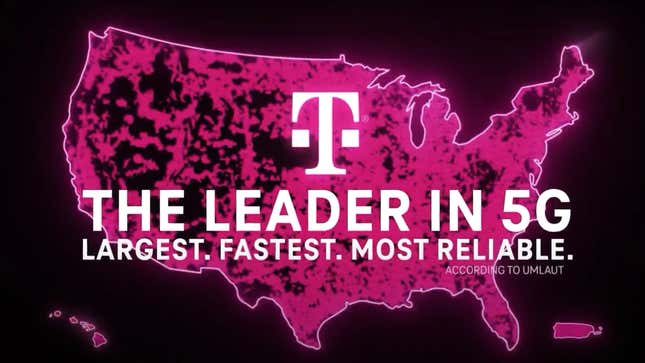
T-Mobile lied, at the expense of low-income prepaid phone subscribers, in order to get its $26.5 billion acquisition of Sprint approved, the California Public Utilities Commission (CPUC) has alleged. Last Friday, in a ruling reported by Ars Technica, the CPUC ruled that T-Mobile may face sanctions for misleadingly claiming that it would keep Sprint’s legacy 3G CDMA network, which Sprint’s Boost Mobile service primarily relies upon, in place for three years.
T-Mobile’s president of technology Neville Ray testified in December 2019 that T-Mobile would “maintain the 800 MHz spectrum for three years to support CDMA service during our migration process.” (The merger was expected to begin in 2020). This is a problem for Boost subscribers, and Dish Network, which acquired Sprint’s Boost Mobile service for pay-as-you-go phones; a longer timeframe would give Dish time to transition millions of Boost subscribers to its own growing 5G network. Dish is building out that network but needs more time to cover most of its customers. The company has been fighting T-Mobile over the bait-and-switch since April.
“Obviously the intent there is to make sure that no Sprint customer during that migration process,” Ray also said, “be they a Boost customer or a Sprint customer, or however they are strayed, [sic] suffers anything approaching a degraded experience.”
The CPUC lists five contradicting claims by T-Mobile:
....1) its CDMA network would be available to its Boost customers until they were migrated to DISH’s LTE or 5G services, 2) maintaining service to the CDMA network did not require use of Sprint PCS spectrum, 3) PCS spectrum would not be used for T-Mobile’s 5G build-out, 4) all former Sprint customers would have a seamless, undegraded experience during the migration period (2020-2023) and 5) DISH would have up to three years in which to complete Boost customer migration.
Unfortunately, the sanctions likely aren’t enough to keep Boost Mobile customers connected. In the ruling, ordering T-Mobile to provide reasons it shouldn’t be sanctioned, it notes that it can fine T-Mobile up to $100,000 for each offense: pennies on the multi-billion dollar acquisition.
In an email to Gizmodo, T-Mobile said that it “absolutely” disagrees with the ruling, which they believe is “meritless and without basis in fact.” “We look forward to presenting evidence and setting the record straight through the upcoming process,” they said. (They’ll have the opportunity in September.) “For months, T-Mobile has been working aggressively to ensure no customer is left behind as we transition to technology that will better serve them into the future.”
T-Mobile has previously provoked the CPUC; in late March, before the CPUC officially voted to approve the merger, the company forged ahead with a surprise announcement that it would close the merger the following day.
The latest is also a slap in the face to the regulators, since the Department of Justice specifically only allowed the T-Mobile acquisition, and dropped an antitrust lawsuit, because the company agreed to divest some of Sprint’s services including Boost Mobile, Virgin Mobile, and Sprint prepaid to Dish. New York and California’s attorney generals (two of over a dozen who fought the merger) also dropped their lawsuit against T-Mobile after the company made promises to support low-income Sprint subscribers and create jobs.
In its April objection, alleging that Ray misled the CPUC about the CDMA shut-down date, Dish indicated that Boost Mobile customers may have already taken financial losses during the pandemic. Because those customers don’t have to provide contact information, and because some of those customers may have been forced to move, its only method of warning them about the change would be through their phones, which may not have constant service. Add to that the fact that it would be hard to produce enough new phones and SIM cards due to the pandemic chip shortage. Dish asked the Commission to force T-Mobile to keep the CDMA network running. In a statement emailed to Gizmodo, Dish applauded the Commission, adding: “The three-year time frame T-Mobile promised is necessary to ensure that millions of CDMA customers are not disrupted or economically disadvantaged.”
If T-Mobile does go ahead with the CDMA network shutdown, the Department of Justice might step in. In a July letter, the DOJ warned that it had “grave concerns” about the potential harms to Boost customers. “If [the CDMA shutdown] manifests—and we sincerely hope that it does not—the Division may act pursuant to its authority under the Final Judgment or seek relief from the Court against one or both Defendants,” the department wrote.
UPDATE 8/17/2020 3:50pm ET: T-Mobile pointed Gizmodo to CEO Mike Sievert’s salty blog posted on August 9th, in which he argued that Boost customers don’t need continued CDMA service because T-Mobile will be providing sufficient affordable 5G for all, “while funding new 5G handsets for those that need them.”
“For the CDMA customers who have not experienced faster 4G/5G service, being on that antiquated network is equivalent to being on dial-up internet access years ago,” Sievert wrote. “Frankly, it’s unacceptable.”
Sievert placed the blame on Dish for not updating its network in time for Boost customers to migrate by T-Mobile’s new deadline, adding that T-Mobile has helpfully provided Dish with a “roadmap.” He added that Boost customers can always go over to T-Mobile instead.
“T-Mobile will not leave our customers behind, and if DISH won’t take care of its customers, we are already offering to do it ourselves. Just a couple of weeks ago we launched one of the most exciting prepaid offers in our history, including free 5G phones on us — to help customers like those at Boost, and other providers, get onto more advanced and reliable technology.”